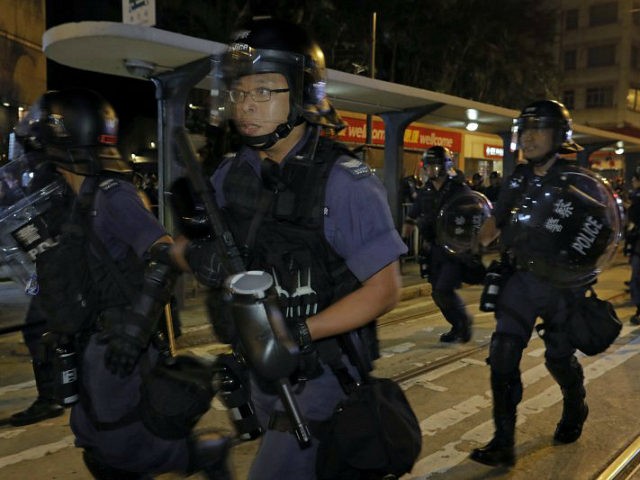China has evidently exceeded its tolerance for democracy along its fringes. There are reports this week that a Taiwanese pro-democracy activist mysteriously vanished during a visit to Macau, while the leaders of 2014’s democracy protests in Hong Kong have been politely arrested.
Taiwan’s Lee Ming-che made it through immigration in Macau but then never arrived at a scheduled meeting the same day, according to the Associated Press. A friend in Macau said he never made it out of the arrivals gate at the airport. He has now been missing since March 19.
Lee’s wife said she was told by Taiwanese officials that her husband might have been detained by state security services. The president of the Taipei college that employed Lee said he might have drawn unpleasant attention to himself with social media posts.
The missing man’s wife, Lee Ching-yu, pleaded with Chinese authorities for information on her husband’s status, reminding them that he needs medication for high blood pressure.
“If he has been arrested, please let me know on what charges. If he is indeed under arrest, I could face that, but please tell me if he’s alive and where he is,” she said.
Taiwan’s Mainland Affairs Council announced on Tuesday that it was working on Lee’s case. Taiwan’s governing Democratic Progressive Party blasted China for causing “anxiety and panic” in Lees’ family. Chinese law enforcement and Foreign Ministry officials have claimed to be unaware of his case.
Reuters notes that relations between Taiwan and the mainland have been especially strained since President Tsai Ing-wen took office in Taipei last year. The Associated Press observes that the social media posts that might have triggered Lee’s arrest concerned life in Taiwan under the Tsai administration.
The New York Times quotes Taiwanese officials who said new laws regulating foreign nongovernmental organizations are now in effect in China, increasing the risks for Taiwanese who travel there. The NYT recalls that at least half a dozen important individuals have apparently been seized from Hong Kong by China recently.
No black-bag operations were involved in the arrest of nine top leaders in Hong Kong’s pro-democracy “Umbrella Movement” this week. The co-founder of the group, which is formally known as Occupy Central, told CBC News he was phoned by the police and told to report to the station for arrest on public nuisance and incitement charges.
CBC describes this as a “provocative” move by China. It is also an unpleasant surprise for the arrested group leaders, since the Umbrella Movement protests occurred two and a half years ago. Another noteworthy example of fallout from the protests was China’s insistence that two young pro-independence legislators be denied the seats they won.
The duo recently lost what looks like their final courtroom bid to reclaim their seats, which were formally denied because they repeated their oaths of office incorrectly. Specifically, they pledged allegiance to the “Hong Kong Nation” instead of China and unfurled a banner reading “Hong Kong is Not China” in case anyone missed the point they were trying to make.
Hong Kong chose a new leader, Carrie Lam, on Sunday. Lam is known as “Beijing’s favorite,” which evidently counts for more than being Hong Kong’s favorite, since her opponent was seen as more popular with the public. Fortunately for Lam, Hong Kong citizens do not get to vote – leadership is chosen by a committee of delegates who are extremely loyal to Beijing. Asked if she would address the critical shortage of democracy in Hong Kong, Lam replied that she would address “easier things” like education and health care first.
One of the freshly arrested Occupy Central leaders, Kin-man Chan, found it bitterly ironic that Lam is talking about “building bridges” while he and his colleagues are being swept up in politically-timed arrests. Lam has claimed to be unaware of plans to arrest the Occupy Central activists immediately after her election.
Clearly not buying those claims, activist Joshua Wong told Australia’s ABC News that Lam was a willing instrument in Beijing’s plans to crush democracy in Hong Kong.
“The target of the Beijing Government is to wipe out all democratic force in Hong Kong, from the prosecution of Umbrella Movement leaders to unseating democratic lawmakers. How come after the day of election the police force would immediately implement the prosecution? I think it’s just the plan of CY Leung and also Carrie Lam,” said Wong, referring to outgoing leader Leung Chun-ying. Lam officially takes office in July.

COMMENTS
Please let us know if you're having issues with commenting.